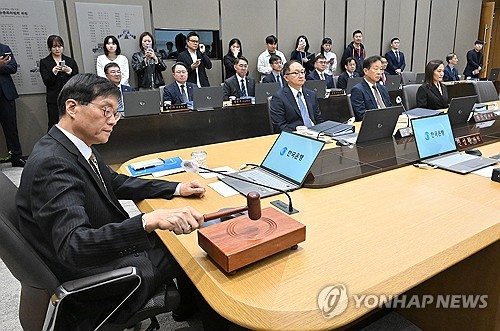(Seoul=Yonhap Infomax) Jee Hyun Son – Participants in the Seoul bond market widely expect the Bank of Korea to keep its benchmark interest rate unchanged at the upcoming Monetary Policy Committee (MPC) meeting scheduled for November 27.
Market sentiment has shifted toward a rate hold as recent domestic and external developments—including the resolution of Korea-US tariff negotiations, expectations of a semiconductor supercycle, a bullish KOSPI, an overheated Seoul metropolitan housing market, and a sharp rise in the USD/KRW exchange rate—have cast doubt on the need for a rate cut.
Particular attention is focused on Governor Rhee Chang-yong of the Bank of Korea, who has recently signaled a potential policy shift with a more hawkish stance. Market participants are keenly watching for any comments on the future direction of monetary policy.
On November 26, Seoul bond market participants projected that the MPC would likely keep the base rate steady at 2.50%.
According to a recent Yonhap Infomax survey of experts at 17 domestic and international financial institutions, all respondents forecasted a rate hold. Of these, nine expect a single rate cut in the first quarter of next year.
The consensus for a rate hold this year has strengthened since the dramatic conclusion of the Korea-US tariff negotiations at the end of last month. With concerns over exports of key products such as semiconductors and automobiles easing, many now expect South Korea’s growth outlook for next year to be revised upward to the potential range of 1.8%–2.0%.
In particular, the semiconductor sector has emerged as a strong growth driver, buoyed by expectations of a supercycle since September. The KOSPI index has also shown robust performance, hovering around the 4,000 mark.
However, key financial stability indicators remain worrisome. Seoul housing prices have accelerated again over the past month, confirming that the overheated metropolitan real estate market is not cooling easily. Meanwhile, the USD/KRW exchange rate has surged above 1,470, maintaining elevated levels and volatility.
Taking these factors into account, the market sees a rate hold at the November MPC as a foregone conclusion, with attention now turning to whether the door remains open for future rate cuts.
There is also interest in whether the concluding statement—“The timing and pace of any additional base rate cuts will be determined”—will be revised, though most market participants do not expect significant changes.
Opinions are divided on whether dissenting votes for a rate cut will be withdrawn. For forward guidance, it is expected that two to three MPC members will keep the option of a rate cut within the next three months open.
“If the dissenting views for a rate cut are withdrawn, remaining expectations for a cut could fade, leading to a bearish market,” said a bond dealer at Securities Firm A. “For forward guidance, it will be important to see whether the majority supports a rate cut or a hold.”
Governor Rhee’s mention of a “policy shift” in a foreign media interview two weeks ago had even prompted some market participants to price in rate hike risks. Whether the possibility of a rate hike will be completely ruled out in the near term remains a key question.
“Governor Rhee is likely to make additional comments regarding the recent policy shift signals, and the key will be how much he can stabilize the market in the process,” said a bond dealer at Securities Firm B.
“The market expects Governor Rhee to make remarks aimed at calming sentiment,” said a bond dealer at Securities Firm C. “However, if he is too dovish, he may not want to see government bond yields fall sharply.”
“It is important to assess how much the market has already priced in expectations for Governor Rhee’s stance,” added a bond dealer at Securities Firm D. “If his comments are in line with market expectations—whether dovish or hawkish—volatility may be limited.”
Some market participants also stressed the need to closely monitor inflation forecasts to gauge the likelihood of a rate hike.
“If the Bank of Korea maintains its inflation outlook at previous levels, concerns about a rate hike raised by some in the market will likely dissipate,” said a bond dealer at Bank E. “We will be watching the inflation forecast closely.”
Additionally, while the November economic outlook is expected to revise next year’s growth forecast upward to the potential range of 1.8%–2.0%, some warn that an excessive upward revision could disappoint the market.
“I don’t think the Bank of Korea will raise its growth forecast to as high as 2.0%,” said a bond dealer at Securities Firm A. “But even an increase to 1.9% could significantly dampen market expectations for a rate cut.”
He added, “Market reactions could differ depending on whether the figure is 1.8% or 1.9%.”
*

jhson1@yna.co.kr
(End)
Copyright © Yonhap Infomax Unauthorized reproduction and redistribution prohibited.

